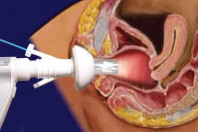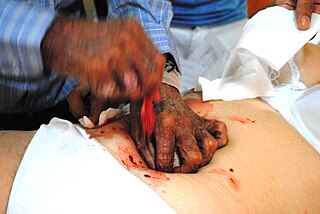| Look up surgery in Wiktionary, the free dictionary. |
Surgery is a medical specialty that uses operative treatment.
Contents
Surgery may also refer to:
| Look up surgery in Wiktionary, the free dictionary. |
Surgery is a medical specialty that uses operative treatment.
Surgery may also refer to:
| | This disambiguation page lists articles associated with the title Surgery. If an internal link led you here, you may wish to change the link to point directly to the intended article. |

Medicine is the art, science, and practice of caring for a patient and managing the diagnosis, prognosis, prevention, treatment or palliation of their injury or disease. Medicine encompasses a variety of health care practices evolved to maintain and restore health by the prevention and treatment of illness. Contemporary medicine applies biomedical sciences, biomedical research, genetics, and medical technology to diagnose, treat, and prevent injury and disease, typically through pharmaceuticals or surgery, but also through therapies as diverse as psychotherapy, external splints and traction, medical devices, biologics, and ionizing radiation, amongst others.

A physician, medical practitioner, medical doctor, or simply doctor, is a professional who practices medicine, which is concerned with promoting, maintaining, or restoring health through the study, diagnosis, prognosis and treatment of disease, injury, and other physical and mental impairments. Physicians may focus their practice on certain disease categories, types of patients, and methods of treatment—known as specialities—or they may assume responsibility for the provision of continuing and comprehensive medical care to individuals, families, and communities—known as general practice. Medical practice properly requires both a detailed knowledge of the academic disciplines, such as anatomy and physiology, underlying diseases and their treatment—the science of medicine—and also a decent competence in its applied practice—the art or craft of medicine.

Gynaecology or gynecology is the medical practice dealing with the health of the female reproductive system. Outside medicine, the term means "the science of women". Its counterpart is andrology, which deals with medical issues specific to the male reproductive system.
Story or stories, may refer to:

In the medical profession, a general practitioner (GP) is a medical doctor who treats acute and chronic illnesses and provides preventive care and health education to patients.
Gp or GP may refer to:

The Divine Comedy are a chamber pop band from Northern Ireland formed in 1989 and fronted by Neil Hannon. Hannon has been the only constant member of the group, playing, in some instances, all of the non-orchestral instrumentation except drums. To date, twelve studio albums have been released under the Divine Comedy name. Between 1996 and 1999, the band released nine singles that made the UK Top 40, including the top-ten hit, "National Express".

Psychic surgery is a pseudoscientific medical fraud in which practitioners create the illusion of performing surgery with their bare hands and use sleight of hand, fake blood, and animal parts to convince the patient that diseased lesions have been removed and that the incision has spontaneously healed.
Doctor or The Doctor may refer to:
Stitch, Stitches or Stitched may refer to:
Shin Hae-chul was a South Korean singer-songwriter and record producer known for being a pioneer of Korean experimental rock music. He was referred to by fans as the "Demon Lord" or "The Devil" for his charismatic stage presence.

Charles David Kelman was an American ophthalmologist, surgeon, inventor, jazz musician, entertainer, and Broadway producer. Known as the father of phacoemulsification, he developed many of the medical devices, instruments, implant lenses and techniques used in cataract surgery. In the early 1960s, he began the use of cryosurgery to remove cataracts and repair retinal detachments. Cryosurgery for cataracts remained in heavy use until 1978, when phacoemulsification, a procedure Kelman also developed in 1967, became the modern standard treatment. Kelman was given the National Medal of Technology by President George H. W. Bush and recognized as the Ophthalmologist of the Century by the International Congress of Cataract and Refractive Surgery in Montreal, Canada. He was also inducted into the National Inventors Hall of Fame in Akron, Ohio, and received the 2004 Lasker Award.

A laparoscopic adjustable gastric band, commonly called a lap-band, A band, or LAGB, is an inflatable silicone device placed around the top portion of the stomach to treat obesity, intended to decrease food consumption.

Allen Richard Selzer was an American surgeon and author.
A medical intern is a physician in training who has completed medical school and has a medical degree but does not yet have a license to practice medicine unsupervised. Medical education generally ends with a period of practical training similar to internship, but the way the overall program of academic and practical medical training is structured differs depending upon the country, as does the terminology used.
"The Death of Queen Jane" is an English ballad that describes the events surrounding the death of a Queen Jane. It is catalogued by Francis James Child as Child #170. Some of the versions given are Scottish, in which the queen's name is Jeanie or Jeany. Due to the close correspondence of names and events, it is often thought that the queen in question is Jane Seymour, the third wife of Henry VIII of England, but this cannot be confirmed. Historically, Jane Seymour gave birth to a son who became Edward VI of England on October 12, 1537. The birth was difficult but natural. She died twelve days later of infection resulting from the birth.

In modern medicine, a surgeon is a physician who performs surgery. There are also surgeons in podiatry, dentistry, orthodontics, and veterinary medicine.
The husband stitch or husband's stitch, also known as the daddy stitch, husband's knot and vaginal tuck, is a purported surgical procedure in which one or more sutures than necessary are used to repair a woman's perineum after it has been torn or cut during childbirth. The claimed purpose is to tighten the opening of the vagina and thereby enhance the pleasure of her male sex partner during penetrative intercourse. Evidence for benefits is lacking.

Shiv Pande is an Indian-born general practitioner (GP) doctor in the United Kingdom. In the 1980s, Pande presented the UK's Asian television programme Aap Kaa Hak, which ran for fourteen years. He was chair of the British International Doctors' Association (BIDA), formerly known as the Overseas Doctors Association (ODA). In addition, he was the first Asian doctor to be elected as treasurer of the General Medical Council. He is a visiting professor at Gauhati University, India, and at the University of Bolton.

Michael John Hargrave was a British general practitioner in Wootton Bassett, Wiltshire, who in 1945 assisted at Bergen-Belsen concentration camp when he volunteered as a medical student from Westminster Hospital at the age of 21.